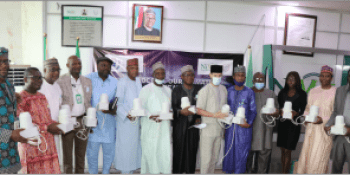PICSA training of trainers: strengthening national and local capacity for climate services for agriculture in Rwanda

Providing farmers with localized, context-specific information which is easy to understand and interpret, enables them to make better farming decisions and helps build their resilience to climate risks and ensures their food security.
Through the USAID funded Rwanda Climate Services for Agriculture project, the CGIAR Research Program on Climate Change, Agriculture and Food Security (CCAFS) is helping communities in Rwanda and national government build their resilience and adapt to climate-related shocks by integrating climate services into decision making processes. This project is being implemented in collaboration with Rwanda’s Meteorological Agency (Meteo Rwanda), Rwanda Agriculture Board (RAB), the International Research Institute for Climate and Society (IRI) at Columbia University and the International Center for Tropical Agriculture (CIAT).
The project builds on and aims to scale up the Participatory Integrated Climate Services (PICSA) approach — which has successfully been used in 7 countries in Sub Saharan Africa — to reach rural communities in Rwanda. PICSA is a participatory process that encourages farmers to take decisions by providing them with weather and climate information, the skills to interpret it, and a range of of livelihood, crop and livestock options that best fits their needs and the expected weather. Through the PICSA approach, agricultural extension staff, development partners and other intermediaries will be trained to integrate climate services into their ongoing work with farming communities across Rwanda’s 30 districts.
Using weather and climate information to make informed decisions
A PICSA training of trainers (ToT) workshop was conducted in Huye town from 12 to 16 June 2017. Organized by CIAT, RAB and Meteo Rwanda, the workshop equipped 68 stakeholders with skills to implement PICSA in their districts. Participants were drawn from all over the country and represented different organizations such as RAB, Meteo Rwanda, the IFAD-funded Climate Resilient and Post-harvest Agribusiness Support Project (PASP), Agriculture Information and Communication Program- Ministry of Agriculture and Animal Resources, Radio Huguka, DEveloppement Rural du Nord (DERN), Caritas Kibuye, CARITAS Kibungo, CARITAS Butare, IRI, IGAD Climate Prediction and Applications Centre (ICPAC) and CCAFS.
The training, which was conducted in two languages (English and Kinyarwanda), was facilitated by experts from CIAT, RAB and Meteo Rwanda with technical support from Peter Dorward from University of Reading and Tufa Dinku from IRI.
Tufa Dinku of @climatesociety training on ENACTS climate information in English and Kinyarwanda @cana_africa pic.twitter.com/cb75xtInob
— CGIAR Climate EA (@cgiarclimate_EA) June 13, 2017
The training module combined short presentations by experts group discussions and presentations by participants, a field practice session, and a wrap up planning session. Specific knowledge gaps as highlighted by the trainees included how to share information with farmers on climate services for agriculture, how to interpret forecasting information, how farmers obtain information on climate change, how farmers can cope with climate variability and change, how to differentiate between climate variability and change, and how to develop seasonal calendars using climate information, amongst others.
The trainees learnt how to use local climate information from historical data to seasonal forecasts to reduce risks associated with climate variability. The trainees and stakeholders were expected to use the knowledge and skills to train farmers how to use climate information to make better decisions in areas where they work. It is anticipated that in so doing, the agricultural productivity would be increased and farmers would become more resilient to future climate change.
This is the third training in Rwanda since the project began in 2016. It is expected that 150,000 farmers will have been trained directly and 750,000 farmers trained indirectly by the end of the project. This target seems ambitious, but through the Twigire Muhinzi approach, this will be achieved. Twigire Muhinzi is a farmer extension model implemented by Rwanda’s Ministry of Agriculture (MINAGRI) and Ministry of Local Government (MINALOC) to ensure that at least one farmer in a village here referred to as a “farmer promoter” is empowered with better skills to improve his livelihood through better use of agricultural advisory information, and neighbours will learn from him or her. Through this model, farmers can easily access basic agricultural advisory information, including weather and climate information through trainings from farmer promoters, mobilisation and demonstration plots in each village.
Next steps
Following the intense training, some of the trainees still had some lingering concerns:
"I am worried about how we shall reach the blind farmers, and those who do not know how to read and write," said Donatha Mukamuganga, Nyamagabe District agronomist.
The trainees are now expected to train farmer promoters in their work places using the existing extension model Twigire Muhinzi. Using this approach, it is anticipated that 20,000 farmers will be trained by the end of 2017. A key observation and recommendation from Peter Dorward of University of Reading is to make the PICSA content and training process as localized and context-specific as possible.
Read more:
- CCAFS Blog: Coordinating climate services with key institutions in Africa
- CCAFS Blog: New program in Rwanda will transform agriculture through climate information and historic data reconstruction
- PICSA Manual: Participatory Integrated Climate Services for Agriculture (PICSA) Manual
Catherine Mungai is the Partnerships and Policy Specialist at CCAFS East Africa.
Desire M. Kagabo is the CCAFS Rwanda Climate Services for Agriculture Project Coordinator based at the International Center for Tropical Agriculture (CIAT), Kigali, Rwanda.
Gloriose Nsengiyumva is the CCAFS Rwanda Climate Services for Agriculture project – Outcome 1 coordinator based at the International Center for Tropical Agriculture (CIAT), Kigali, Rwanda.
Maren Radeny is the Science Officer at CCAFS East Africa.



